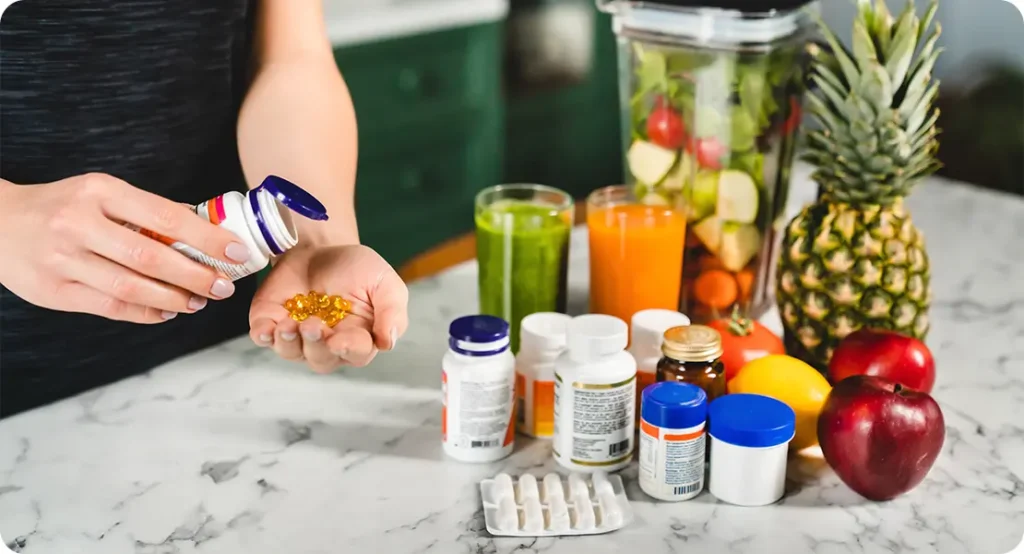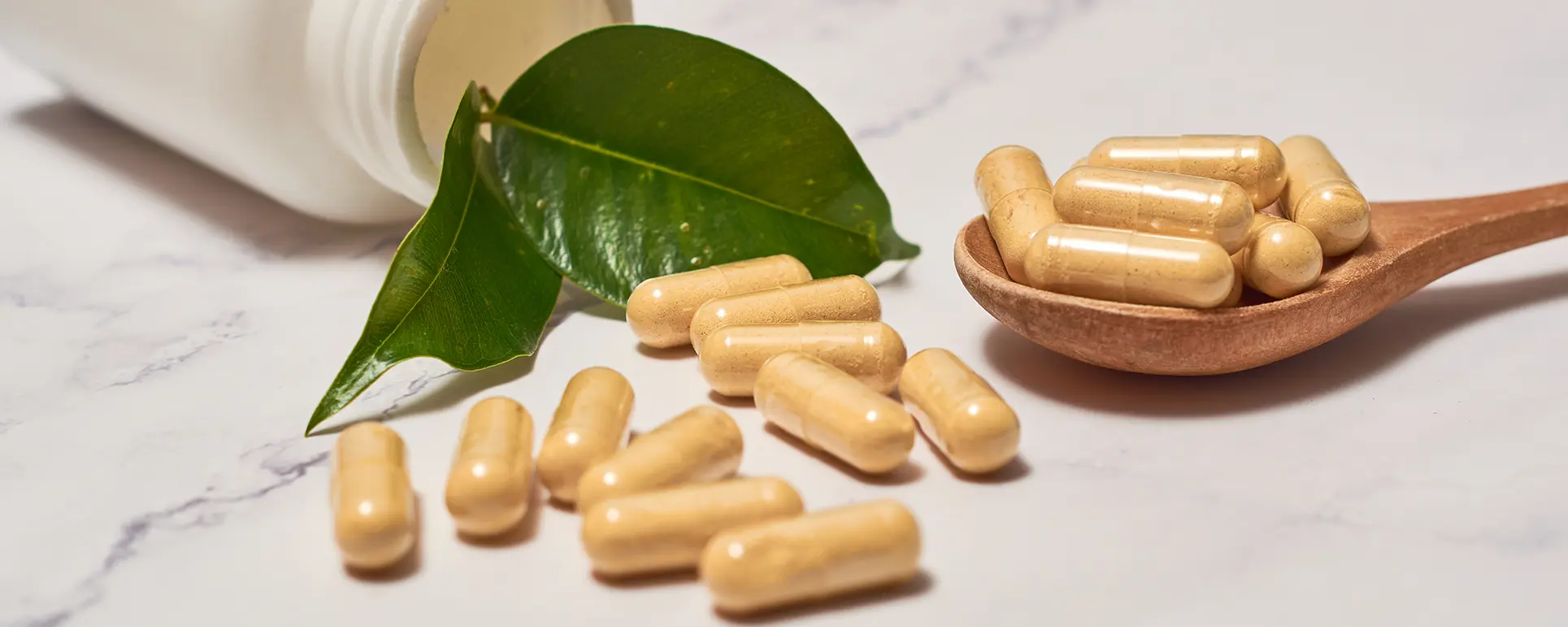These days, it feels like there’s a supplement for everything and skincare is no exception. From beauty powders and capsules to collagen shots and vitamin gummies, the market is bursting with products claiming to support radiant, youthful skin from the inside out. They promise smoother texture, fewer breakouts, improved elasticity, and even reduced signs of ageing. With so many bold claims, it’s only natural to wonder: do these supplements actually deliver results, or are they just another wellness trend?
Popular ingredients like collagen, biotin, zinc, and a mix of skin‑targeted vitamins often appear in these formulations. They’re said to enhance hydration, reduce inflammation, promote skin repair, and boost overall skin health. But are these benefits backed by solid science or just propped up by clever marketing?
Beyond the enticing labels, it’s worth remembering that skin reflects overall health. Diet, sleep, stress, and environmental factors all influence complexion, and no capsule can fully compensate for poor lifestyle habits. Dermatologists frequently remind patients that a balanced diet rich in protein, healthy fats, antioxidants, and plenty of water provides broader benefits than isolated nutrients. Supplements, they argue, should fill specific nutritional gaps not replace good nutrition. Still, for people with restrictive diets, digestive issues, or medically confirmed deficiencies, targeted supplementation can make a noticeable difference.
In this article, we’ll take a closer look at the most common ingredients found in skin supplements and examine the evidence behind their effectiveness. More importantly, we’ll explore what dermatologists actually think about taking supplements for your skin. Are they worth the investment or is your skincare routine (and a balanced diet) doing enough already?
Common Skin Supplements and Their Potential Benefits
1. Collagen Supplements
Collagen is the most abundant protein in the human body and plays a crucial role in maintaining the skin’s firmness, elasticity, and overall structure. It forms the scaffold that keeps skin plump and youthful, making it a key target for anti-ageing strategies. Unfortunately, as we age typically starting in our mid-20s our natural collagen production begins to decline. This drop accelerates with sun exposure, smoking, poor diet, and other lifestyle factors, eventually leading to visible signs of ageing such as fine lines, wrinkles, and sagging skin.
In response to this natural decline, collagen supplements have flooded the wellness and beauty market. These supplements come in various forms powders, capsules, drinks, and even chewable gummies all claiming to replenish lost collagen and restore youthful skin from within.
Do They Work?
Scientific studies suggest that collagen supplements, particularly those containing hydrolyzedcollagen peptides, may offer measurable skin benefits. These peptides are broken down into smaller amino acid chains that the body can absorb more easily and may stimulate the body’s own collagen production. Research has shown improvements in skin hydration, elasticity, and wrinkle depth after consistent use over several weeks.
However, results can vary depending on factors like the type of collagen used, dosage, duration, and the individual’s age and overall health. It’s also worth noting that the benefits are often modest and take time to appear.
Dermatologist Insight
While collagen supplements can support skin health, many dermatologists advise managing expectations. According to Dr. Karen Lam, a board-certified dermatologist, “Collagen supplements can provide benefits, but they’re not a replacement for more effective treatments like topical retinoids or peptides, which directly target the skin.”
She also stresses that sun protection remains essential. “The best thing you can do for collagen preservation is to wear sunscreen daily. Without it, any gains from supplementation can be quickly undone by UV damage.”
2. Biotin (Vitamin B7)
Biotin, also known as Vitamin B7, is a water-soluble B-complex vitamin that plays a vital role in the body’s ability to convert food into energy. It supports the health of your skin, nerves, digestive tract, metabolism, and most famously your hair and nails. Because of this, biotin has become a go-to ingredient in beauty supplements promising stronger nails, fuller hair, and clearer skin.
It’s frequently found in multivitamins, hair-skin-nail blends, and standalone capsules. You’ll also see it promoted in everything from chewable gummies to beauty drinks. Biotin occurs naturally in foods like eggs, salmon, nuts, seeds, and sweet potatoes, and most people who eat a balanced diet already consume sufficient amounts of it.
Do They Work?
Biotin is often marketed as a skin-enhancing vitamin, but when it comes to direct effects on the skin, the scientific evidence is limited. Most of what we know about biotin’s benefits comes from treating biotin deficiency, a rare condition that can lead to dry, scaly skin, thinning hair, brittle nails, and even rashes around the eyes, nose, and mouth.
For individuals with a genuine deficiency whether due to genetics, pregnancy, certain medications, or chronic alcohol use biotin supplements can significantly improve symptoms, including the condition of the skin. However, for those with normal biotin levels, taking extra biotin is unlikely to deliver noticeable improvements. It’s not a magic bullet for skin concerns like acne, rosacea, or chronic dryness.
Dermatologist Insight
Dr. Jenna A. Sutton, a board-certified dermatologist, puts it simply: “If you’re not deficient in biotin, supplements probably won’t make a significant impact on your skin health.” She adds that many patients are surprised to learn that more biotin doesn’t necessarily mean better results and in some cases, excessive biotin can interfere with lab test results, including hormone and thyroid panels.
Ultimately, biotin may be beneficial for a small group of people, but it’s not a one-size-fits-all solution for skin health.
3. Zinc Supplements

Zinc is an essential trace mineral that supports many critical functions in the body, including immune response, cellular repair, and enzyme activity. When it comes to skin health, zinc plays a particularly important role in regulating inflammation, controlling bacterial activity, and facilitating wound healing all of which are relevant to common skin concerns like acne, rosacea, and eczema.
This is why zinc is frequently included in both oral and topical treatments for acne-prone skin. You’ll find it in over-the-counter spot treatments, prescription creams, and a wide range of supplements formulated for clearer skin. Zinc is also naturally found in foods such as pumpkin seeds, lentils, red meat, eggs, dairy, and whole grains.
Do They Work?
Zinc supplementation has shown promising results for managing mild to moderate acne, particularly in individuals with a known zinc deficiency. Its anti-inflammatory and antibacterial properties can help calm inflamed breakouts, reduce sebum production, and promote faster healing of blemishes. Some studies have even found that oral zinc may be as effective as low-dose antibiotics in reducing acne lesions without the risk of antibiotic resistance.
However, like all supplements, the key lies in appropriate dosing. Taking too much zinc over an extended period can lead to side effects such as nausea, stomach cramps, and in severe cases, copper deficiency or immune dysfunction. It’s important to note that not all forms of zinc are equally bioavailable; zinc picolinate and zinc gluconate are among the more easily absorbed options.
Dermatologist Insight
“Zinc can be effective for managing acne, particularly in people with deficiencies,” says Dr. Ruth Johnson, a dermatologist at the London Dermatology Centre. “However, it’s best to consult a dermatologist to determine the proper dosage and form, as excessive intake can do more harm than good.”
In summary, zinc supplements may benefit those with acne but they’re not a blanket solution. Always speak with a healthcare professional before starting supplementation, especially if you’re already taking other medications or nutrients.
4. Vitamin C Supplements
Vitamin C, also known as ascorbic acid, is a water-soluble antioxidant that plays a crucial role in maintaining healthy skin. It supports collagen synthesis, neutralises free radicals, aids in skin regeneration, and helps protect against environmental aggressors like pollution and UV radiation. It’s also known for brightening dull complexions and fading dark spots, which is why it’s a staple in many topical skincare products from serums to moisturisers.
When it comes to supplements, Vitamin C is often promoted for its ability to boost overall immunity and promote skin repair from within. You’ll find it in tablets, effervescent powders, capsules, and even gummy formats, often combined with other beauty-focused ingredients like zinc, collagen, or hyaluronic acid.
Do They Work?
Vitamin C is undeniably effective when applied directly to the skin, particularly in stabilised topical forms such as L-ascorbic acid. These formulations can significantly reduce hyperpigmentation, improve skin tone, and increase firmness. However, the efficacy of oral Vitamin C supplements for skin improvement is more nuanced.
Research suggests that high-quality Vitamin C supplements may contribute to improved skin hydration, texture, and collagen production over time especially in individuals with low dietary intake. However, the results are generally subtler than those achieved through topical application. That’s because oral Vitamin C is distributed throughout the body, not just to the skin, and high doses are excreted if not absorbed.
Still, for those who don’t consume enough fruits and vegetables rich in Vitamin C like citrus fruits, berries, kiwi, and bell peppers supplementation may help support skin resilience and healing.
Dermatologist Insight
Dr. Emily Clark explains, “While topical vitamin C has a proven track record for treating dark spots and improving skin tone, oral supplements may have a slower, less noticeable effect. They can still support collagen production and antioxidant defence, but they’re not a quick fix.”
When Should You Use Skin Supplements?

Skin supplements can be beneficial in certain circumstances, but they’re not a substitute for a healthy diet, consistent skincare, or professional dermatological care. While these products are often marketed as miracle fixes, dermatologists are clear: supplements work best when used strategically and for the right reasons. When chosen carefully and combined with a well-rounded routine, they can play a supportive role in maintaining and enhancing skin health.
Below are a few situations where dermatologists may recommend skin supplements:
1. To Address Nutritional Deficiencies
One of the clearest indications for using skin supplements is when a deficiency has been identified. If blood work or symptoms reveal that you’re low in nutrients like biotin, zinc, or vitamin C, supplements can help restore internal balance. This, in turn, may improve related skin issues such as dryness, slow wound healing, or increased inflammation. Deficiencies are more common in people with restrictive diets, certain health conditions, or poor absorption of nutrients.
2. To Complement Your Skincare Routine
Supplements can also act as a supportive layer to your existing skincare efforts. For example, collagen peptides or biotin may provide additional support for those already using topical treatments like retinoids, antioxidants, or moisturisers. They may not dramatically change your skin on their own, but when paired with good habits such as proper hydration, sun protection, and a healthy diet they can enhance long-term results.
3. For Ageing Concerns
As collagen production declines with age, collagen supplements are often marketed to reduce fine lines and improve skin elasticity. Some studies suggest mild improvements in hydration and firmness after consistent use. However, they work best when used alongside proven anti-ageing treatments, such as retinoids, peptides, and professional procedures like microneedling or laser therapy.
What Should You Avoid?
While skin supplements can support your skincare goals, they are not miracle solutions. It’s easy to be swayed by bold claims on product labels or influencer endorsements, but it’s important to approach supplements with realistic expectations and informed decision-making. Here are some key things to avoid when considering skin supplements:
1. Relying Solely on Supplements
Perhaps the biggest mistake people make is thinking that supplements alone will fix all their skin concerns. In reality, supplements should support not replace a healthy diet, good skincare habits, and consistent sun protection. For example, taking collagen supplements while skipping SPF or relying on biotin without addressing hormonal acne won’t lead to meaningful improvements.
Topical treatments like retinoids, vitamin C serums, niacinamide, and moisturisers have direct, proven effects on the skin. Likewise, wearing sunscreen daily is essential for preventing premature ageing and pigmentation. Supplements can help internally, but they cannot undo external damage or neglect.
2. Ignoring Professional Advice
Before adding any new supplement to your routine, it’s important to speak with a qualified dermatologist, especially if you’re dealing with ongoing skin concerns or taking other medications. Some nutrients, such as zinc or vitamin A, can be harmful in high doses and may interact with prescription treatments or existing health conditions.
According to dermatologists, over-supplementation is becoming increasingly common, often due to self-diagnosis or social media trends. In some cases, unnecessary supplements can cause digestive issues, hormonal disruptions, or interfere with blood test results (as seen with high-dose biotin).
3. Chasing Trends Without Evidence
Just because a supplement is trending doesn’t mean it’s effective. Many products on the market have little to no clinical research backing their claims. Always look for third-party testing, transparent labelling, and evidence-based formulations rather than buzzwords and celebrity endorsements.
Frequently Asked Questions (FAQs)
1. Do dermatologists actually recommend skin supplements?
Yes, dermatologists may recommend skin supplements in specific cases such as when you have a confirmed deficiency (e.g., zinc or biotin) or as supportive care alongside topical treatments. However, supplements are not usually the first line of treatment and should not replace a proper skincare routine or medical advice.
2. Which supplement is best for glowing skin?
Supplements containing collagen, vitamin C, and antioxidants may support skin hydration, firmness, and brightness when paired with a healthy lifestyle. Still, glowing skin is best achieved through a combination of good nutrition, sun protection, hydration, and consistent skincare habits.
3. Can skin supplements treat acne?
Some supplements like zinc and omega-3 fatty acids may help reduce inflammation and regulate oil production in acne-prone skin particularly if you are deficient in those nutrients. However, they work best when used in combination with proven topical acne treatments prescribed by a dermatologist.
4. Are there any risks to taking skin supplements?
Yes. Taking supplements without medical advice especially in high doses can lead to side effects like stomach upset, hormonal imbalance, or even toxicity (e.g., from too much zinc or vitamin A). Always consult a healthcare provider before starting new supplements.
5. How long do skin supplements take to show results?
It varies. Most people may notice subtle changes in 8–12 weeks, especially with collagen or vitamin C. However, results depend on the supplement type, dosage, individual health, and whether there’s a nutrient deficiency being addressed.
Final Thought: Supplements Are a Tool Not the Whole Routine
While skin supplements like collagen, zinc, and biotin can offer some benefits, they are most effective when used as part of a comprehensive skincare regimen. Dermatologists generally recommend supplements for specific issues like deficiencies or acne, but they are not a substitute for topical treatments or professional care.
You can get in touch with us to book a consultation with one of our expert dermatologists in London. We offer personalised advice on whether skin supplements are right for you, along with tailored treatments to help you achieve your skin goals.
References:
- Pu, S.Y. et al., 2023. Effects of Oral Collagen for Skin Anti-Aging: A Systematic Review and Meta-Analysis of Randomized Controlled Trials. Journal of Cosmetic Dermatology. https://www.ncbi.nlm.nih.gov/pmc/articles/PMC10180699/
- Demir-Dora, D., Campos, L.D. & Ozturk, E., 2024. The Efficacy and Safety of CollaSel Pro® Hydrolyzed Collagen on Skin Elasticity, Hydration and Wrinkle Reduction: Systematic Review of RCTs. Journal of Clinical Medicine, 13(18), 5370. DOI: https://doi.org/10.3390/jcm13185370
- Thompson, K.G. & Stylianou, N., 2021. A Review of the Evidence for Zinc, Biotin, Vitamin D, Nicotinamide and Polypodium in Dermatology. Journal of the American Academy of Dermatology, 85(1), pp.182–190. https://www.jaad.org/article/S0190-9622(20)30744-1/fulltext
- Reilly, D.M. et al., 2024. A Clinical Trial Shows Improvement in Skin Collagen Structure, Hydration, Elasticity and Wrinkle Reduction After 12 Weeks of Oral Collagen Supplementation. Dermatology Research and Practice. https://pubmed.ncbi.nlm.nih.gov/39021368/
- Januszewski, J., Adkins, A. & Cochrane, M., 2023. Nutritional Supplements for Skin Health A Review. Nutrients, 15(7), 1602. https://www.mdpi.com/2072-6643/15/7/1602
